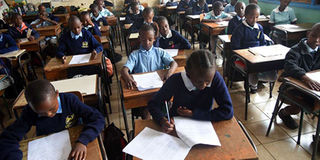The big competence-based curriculum assessment lie in 2022

Grade Three pupils at State House Primary School in Nairobi rehearse as they await the new competence-based curriculum reading assessment on September 18, 2019. The exercise was chaotic. PHOTO | FILE | NATION MEDIA GROUP
What you need to know:
- Dr Obura thinks that the education authorities have already settled on competitive national exams but don’t want to be seen to be the ones pushing the idea, having promised change all along.
- Education authorities haven’t even indicated what standardised assessment method will be used for secondary selection at Grade 6.
During her time at Jogoo House, the Ministry of Education headquarters in Nairobi, Amina Mohamed didn’t quite get the public to fall in love with her.
The major reason for that cold relationship was her personality and leadership style, which contrasted sharply with that of her predecessor Fred Matiang’i, then widely popular for his bulldozer approach to education reforms.
But it also had something to do with Amina’s political naivety to admit policy failures at a time the government had significantly succeeded in rallying Kenyans behind many of its programmes.
Whenever she reflects on her transfer to the lesser Sports docket in a Cabinet shuffle, she most probably looks back at the time she came out to announce that the Ministry of Education was ill-prepared to rollout the new competence-based curriculum (CBC) as the moment she ended her tenure at Jogoo House.
Yet sooner or later, Kenyans will discover they should have listened to Amina after all.
EVALUATION METHOD
If you thought that the recent nationwide assessment for Grade 3 pupils was chaotic, it is because you haven’t imagined the scale of chaos ahead.
Education expert Anna Obura, reacting to my column on CBC last week, says 2022, when the pioneer class of CBC will be expected to select their preferred public secondary schools at Grade 6, is the year to watch.
With only three years to go, the education authorities haven’t even indicated what standardised assessment method will be used for secondary selection at Grade 6.
Keeping with the comical bureaucratic Kenyan tradition of appointing multiple commissions to inquire into this or that matter, yet another task force has been set up to look into the assessment method.
EXAMS
Dr Obura thinks that the education authorities have already settled on competitive national exams but don’t want to be seen to be the ones pushing the idea, having promised change all along.
“The public will end up demanding competitive standardised and scientifically designed, administered, marked and moderated exams as the only fair selection mechanism. The Ministry of Education knows this already but must be waiting for ‘the people’ to demand it.
That will let them off the hook. ‘It’s not us, it’s you that are demanding this’. Everyone will lament the return to exam-oriented education and throw up their hands in dramatic dismay, yet any education planner worth his salt would have known this even before the introduction of CBC. It would have been honest of ministry to have acknowledged this at the start of CBC,” she says.
Well, it would seem that the government is already hearing all the right things it wants to hear, and ‘the people’ are reading from the same script.
Three days after I received Dr Obura’s email predicting the return of examination-oriented education, the dovish teachers union KUPPET showed up before the task force to demand a national exam for Grade 6.
Watch out for the big assessment lie in 2022.
[email protected]. @otienootieno





